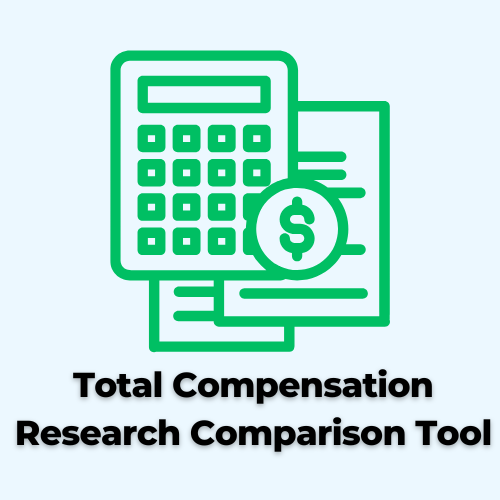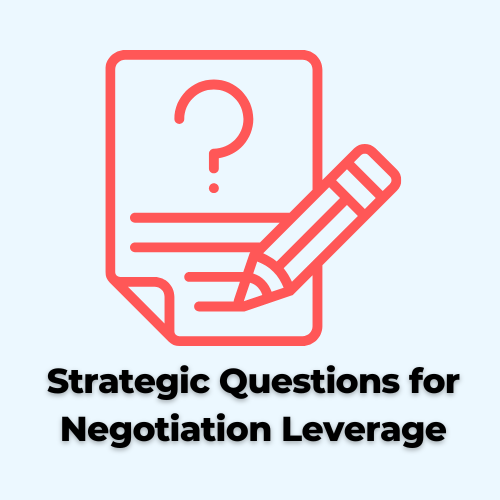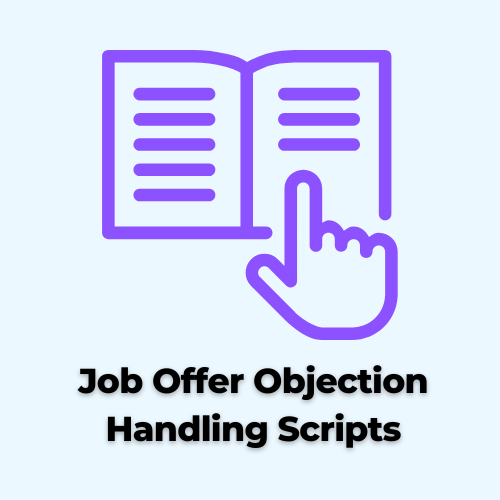Salary Negotiation - How to Negotiate Offer Letters
If you’ve recently decided to take a step forward in your career journey by pursuing a new job, then this guide is for you. Working at a new company is a huge accomplishment, so if you’ve been fortunate enough to land a new job offer then our salary negotiation team can help you make sure it’s competitive before accepting.
Our goal in this article is to make sure you don’t accept the first job offer that comes your way and instead ensure you receive competitive compensation through a successful salary negotiation. This is designed to be your how to negotiate offer letters guide.
Offer negotiations are not only incredibly common, but they're also highly effective when done right. Whether this is your first time negotiating an offer or you’ve been through the salary negotiation process before, we’re going to share salary negotiation tips that actually work. These are the same strategies and insights that have helped hundreds of professionals like you receive compensation packages at the top of their role’s pay bands.
For those who prefer learning by video, we've also created a how to negotiate a job offer salary video guide. Otherwise, this article provides the same salary negotiation tips and strategies as the video.
In this article, you’ll learn how to evaluate total compensation in a job offer, our proven step-by-step salary negotiation strategies, and the main mistakes to avoid in a salary negotiation – that way you can walk away with a stronger offer letter in hand.
Want to Negotiate an Offer? Get offer-specific guidance from a Salary Negotiation Coach. We help career professionals negotiate competitive job offers.
Or leverage our Salary Negotiation Courses and Salary Negotiation Templates.
 Job Offer Negotiation Course
Job Offer Negotiation Course
- Get our job offer negotiation strategies, templates, scripts, and guidance.
- Access our step-by-step lessons, compensation research guides, and tools.
- Access Now
 Raise Negotiation Course
Raise Negotiation Course
- Get our raise negotiation strategies, templates, scripts, and guidance.
- Access our step-by-step lessons, compensation research guides, and tools.
- Access Now
Understanding Job Offer Compensation Package Components
A successful salary negotiation will be impossible if you don’t have a clear understanding of what’s included in your compensation package. This means looking beyond just your base salary and evaluating all elements that contribute to your total compensation in your next role.
For example, job offers may include a wide range of compensation components, including a base salary, bonus, equity package, and a sign-on bonus. The total compensation that you might receive in an offer letter could be split across the following compensation components:
BASE SALARY
BONUS
EQUITY GRANT
SIGN-ON BONUS
EQUITY REFRESH
Here is what the average total compensation for a software engineer salary at a large tech company might look like:
So why is evaluating the different elements of your compensation package so important? When you have a full understanding of each compensation component, you can calculate your total annual take home pay accurately before negotiating. That way you increase all components during the salary negotiation – not just one.
Keep reading and we’ll break down the most common components of a compensation and benefits package in detail.
BASE SALARY
Let’s start with the compensation component you’re probably most familiar with – base salary. A base salary is the guaranteed fixed pay you receive in exchange for the work you do at a company and it will stay the same unless you receive merit increases or a promotion.
Most companies will have a fixed base salary range for each specific role type and level, and the base salary that you’re initially offered can fall anywhere between these designated ranges. For example, the base salary ranges for a senior software engineer salary will look different from the ranges for a staff software engineer salary. The same is true even for offer letters at the same level. For example, the base pay ranges for a product designer salary will differ from the ranges for the same level product manager salary.
Compensation teams at most companies try to issue their initial offers at the lower to mid-end of the base salary range for the role – which is why it’s important to negotiate for a higher base salary. But as we mentioned earlier, that’s just one component of total compensation so it should be negotiated along with the other components and not alone.
BONUS
Your job offer might also include an annual bonus. Similar to the bonuses found in a Meta offer letter or Google offer letter, a bonus is usually performance based which can be dependent on either your personal or company performance. It is usually over a set period of time (i.e., annual bonus or quarterly bonus) and is calculated according to a percentage of the base salary.
Most bonuses will range between 5-35% or higher depending on role level, role type, and department (i.e., the bonus for an engineering manager salary would be higher than that for a same data scientist salary). Receiving a bonus in your compensation package is a key benefit considering not all companies provide this compensation component. For example, you will not receive a bonus in a Netflix offer letter or Nvidia offer letter.
While the bonus percentages are usually non-negotiable, the bonus itself is calculated based on your base salary. So the higher you negotiate the base salary in a job offer, the higher the bonus will be.
EMPLOYEE EQUITY
Many career professionals seek out certain companies because of the opportunity for employee equity. This is a highly valuable compensation perk that can significantly grow your earnings over the course of your career.
Equity is typically offered as an initial equity grant as part of a job offer. It usually comes in the form of either restricted stock units (RSUs) or employee stock options. RSUs represent actual stock which means you receive shares of the company’s stock outright once vested. Stock options give you the right to purchase company stock at a predetermined price (i.e., you have to pay or “exercise” these options to receive actual shares).
Employee equity grants will come with a stock vesting schedule, which means you’ll need to wait for the equity to vest according to that schedule before you actually own the shares or options. Most stock vesting periods are 3–4 years with the equity vesting in increments over that time – the stock vesting schedule may be evenly distributed or staggered.
For example, Meta’s RSU vesting schedule is a four-year period with equal annual vesting – 25% vests each year. However, you’ll find a staggered approach for the Amazon RSU vesting schedule – 5% vests at the end of year one, 15% at the end of year two, and 20% every six months after that until the end of their four-year vesting period.
Just keep in mind that the value of equity does fluctuate with your company’s stock price. If the stock performs well, so will your total compensation. But if it drops, your equity value will take a hit too.
The good news is that equity packages are usually negotiable. However, you should always negotiate equity alongside the other compensation components and not by itself or you will not increase the total compensation. Recruiters will just move money from one bucket to the other and your total compensation will not increase as a result.
SIGN-ON BONUS
Most roles should be eligible for a sign-on bonus. A sign-on bonus is a one-time hiring bonus you could receive to incentivize you to join and to make up for any lost bonuses or unvested equity at your former company.
Signing bonuses are typically paid out 30 days after you start at a new company and often come with a repayment clause if you leave within a certain period – usually 12 months.
Even if you are not walking away from money at your current company or you’re currently unemployed, we’ve still had success securing sign-on bonuses. So don’t count a signing bonus out regardless of your situation.
STOCK REFRESHER
Most companies that offer equity to their employees will also provide an annual stock refresher (more RSUs or stock options). This annual stock refresh will have its own stock vesting schedule.
With that being said, we don’t include this component in our total compensation calculation because recruiters are typically unwilling to share the expected annual amount for a stock refresher. This makes it difficult to know how much you’ll receive until you actually reach each refresher. It’s better to not include this in your total compensation unless you have a guaranteed amount to expect each year from the employer.
We still encourage you to ask the recruiter about the stock refresher to see if this perk exist at their company.
EMPLOYEE BENEFITS AND PERKS
Your offer letter may also include a variety of employee benefits and perks, such as health benefits (medical, dental, and vision), a 401(k) match retirement program, family leave, paid time off (PTO), commuter perks, education reimbursement, fitness memberships, and other incentives. These benefits can vary significantly between companies and there’s no set standard.
Tech companies generally offer more competitive employee benefits and perks compared to other industries, including things like free meals and remote office stipends. It’s important to understand exactly what employee benefits and perks are included in your offer.
You may have noticed that our list of total compensation components doesn’t include employee benefits and perks.
That’s intentional – we’re specifically focused on monetary take-home pay. That’s because take-home income is the most consistent baseline for comparing offers and negotiating the monetary side of compensation. Employee benefits and perks are valuable, but they aren’t considered part of total compensation.
While employee benefits and perks are typically non-negotiable, we still recommend asking about them during the due diligence phase of your negotiation. You sometimes may be able to work out an off-the-record arrangement with your hiring manager (such as additional vacation days) but that usually depends on the company’s size and flexibility.
Steps for a Salary Negotiation
There’s a lot of bad salary negotiation advice out there, so our goal is to give you proven salary negotiation tips that actually work – which are backed by hundreds of real salary negotiations. Our salary negotiation steps are built on years of experience and are designed to help you correctly navigate the comp negotiation process. They also ensure you keep a positive relationship with the hiring team and don’t jeopardize the opportunity.
While these steps are key to a successful salary negotiation, working with a Salary Negotiation Coach or taking our Offer Negotiation Course gives you access to all of our strategies, tools, and support to help you navigate the process the right way.
1) Understand The Components Of An Offer Compensation Package
If you’ve been following along so far you should already have the first step to a successful salary negotiation complete – understanding each of the compensation components in an offer package.
The main goal here is to make sure you’re clear on your total compensation before trying to negotiate an offer. If you need help with this step then we highly recommend using our Total Compensation Tool to help layout and understand your total compensation.

- Understand Total Compensation – Use our tool to break down and calculate the compensation in your job offer.
- Research & Compare Offers – Organize your compensation research and determine the right counter amount.
- Get Here
2) Ask Strategic Questions And Complete Due Diligence On Offer Letter
Next, you’ll want to start asking strategic questions to the recruiting team to ensure you have a full understanding of the offer and benefits. This step is all about building leverage before you begin the compensation negotiation. It helps by:
Gaining the insights needed to craft an effective counteroffer.
Signaling to the hiring team that you're thoughtfully evaluating the offer – that way your ask doesn’t come out of left field.
Skipping this step can make your counteroffer less effective and not as well received. The goal here is to show the recruiting team that you're doing your homework and working through the offer. It helps frame your counter for better pay as a well thought out decision and not just a blanket ask for “more money.”
If you’re unsure what to ask, you can use our Strategic Questions to Build Negotiation Leverage. We also recommend starting this step within the first 24–48 hours of receiving your offer so the hiring team knows you’re engaged and working towards acceptance. Sitting on an offer without communication can come across as disinterest to the hiring team.

- Build Negotiation Leverage – Ask the right questions to strengthen your negotiation before sending a counter.
- Email & Phone Scripts – Get our list of questions to ask and what to say if the recruiter wants to chat through them.
- Get Here
3) Research What The Compensation Should Look Like
It’s absolutely essential that you take the time to research the compensation for the role – both the base salary and total compensation range. That way you can determine the strength of your initial offer package and identify how much more you should counter for.
As we explained earlier, compensation structures are generally dictated by predetermined salary ranges for each individual role – meaning your research must be specific to your exact level and position. You wouldn’t want to come to the table with data on a software engineer salary if your offer was actually for a senior software engineer salary.
Sites like Glassdoor and Salary.com can be great resources for this compensation research. However, keep in mind that the salary ranges on public sites like these are often self-reported by current or former employees, so they may not reflect the most up-to-date offers for new hires. This is especially true given the changes in compensation from year to year due to the equity component (i.e., if you see high comp data on a comp site it might be due to equity appreciation and not what they typically offer a new hire).
For the most accurate data, we recommend cross-referencing pay data across multiple platforms. We created our Total Compensation Research Comparison Tool to help you streamline your salary research and effectively analyze pay ranges for your role in this step.

- Understand Total Compensation – Use our tool to break down and calculate the compensation in your job offer.
- Research & Compare Offers – Organize your compensation research and determine the right counter amount.
- Get Here
4) Send A Counteroffer To The Recruiter
Now that you have your compensation research in hand, you should be ready to develop a strategic counteroffer and send it to the recruiter.
The goal of this step is to take a data-based approach and not just reiterate what you would bring to the team – remember, the hiring team already knows the skills you bring to the table which is why you received a job offer.
We highly recommend sending the counteroffer through email to reduce the risk of going off topic on a call. Email also gives the recruiter something accurate and tangible to share and review with the compensation team.
So what should you include in your counteroffer? Begin by respectfully communicating how the benefits in your initial offer differ from other companies and/or your current role offer. You should then reference the top end of the pay ranges you’ve gathered and that you should be paid in line with that pay.
It’s key to have proper communication in your counter offer so you can use our Counteroffer Email Templates if needed to help communicating this correctly.

- Proven Counteroffer Templates – Built from hundreds of successful job offer negotiations.
- Negotiate with Confidence – Remove the guesswork with our professionally crafted counteroffers.
- Get Here
5) Handle Recruiter Pushback On The Counteroffer
Finally, once you’ve sent over a counteroffer you will want to prepare yourself for some pushback from the recruiter.
In most cases, the recruiting team will come back saying that they can’t make any increases or changes to the offer package. Don’t be worried if this happens as it’s a normal part of the process. Instead, simply respond professionally by stating you understand their constraints, but ask again if they could take your counter back to their comp team for one last look (like how we explain in our Recruiter Objection Handling Scripts). You should still ask even if they insist their team will just say no.

- Overcome Recruiter Pushback – Proven scripts to handle pushback and keep your salary negotiation on track.
- Communicate Effectively – Use expert responses to get recruiters to advocate for you with the compensation team.
- Get Here
After taking your thoughts back to their team, they should return with an improved offer. If the updated compensation package aligns with your goals and the salary bands you researched, then you should be ready to send over our Offer Acceptance Email to document it and lock it in!

- Accept or Decline – Expert crafted job offer acceptance email and rejection email templates to share your decision.
- Professional & Genuine Tone – These help you communicate in a professional manner regardless of what you decide.
- Get Here
Common Salary Negotiation Mistakes
As we mentioned earlier, there's a lot of bad advice out there from career coaches and ex-recruiters who haven’t actually managed hundreds of salary negotiations. Our goal is to help you cut through that noise and navigate a salary negotiation the right way.
We’ve outlined the most common mistakes to avoid in an offer negotiation below. While these tips are valuable and will help you, we still recommend working with a Salary Negotiation Coach or taking our Job Offer Negotiation Course to ensure you steer clear of salary negotiation mistakes.
Avoid Sharing Salary Expectations Before Getting an Offer
The recruiting team knows exactly how much they can pay for their roles and by telling them your salary expectations it is not going to guarantee a certain outcome. That’s a fact so don’t think you’re negotiating when sharing salary expectations.
For example, if you share a lower salary expectation with the recruiter than what they could offer, they will then be motivated to offer you that lower compensation or down level you (yes, down-level – very common at tech companies). On the other hand, if you answer with a number higher than what they are able to realistically offer, they could become disinterested and decide to go with a different candidate.
Sharing your salary expectations before you have a offer in hand makes it more difficult to receive a competitive compensation package in almost all cases – whether you share these details verbally or on job applications.
However, you should prepare yourself for pressure from the recruiting team because they will ask this and there is a right and wrong way to respond. We provide our Salary Expectation Responses for you to use so you can overcome their tactics and hopefully secure a competitive initial offer.

- Salary Expectation Responses – Scripts to overcome recruiter salary expectation discussions and pre offer calls.
- Avoid Lowballing Yourself – These call scripts and email templates will help you get a competitive offer.
- Get Here
Be Realistic in What You Ask For
It’s easy to jeopardize a relationship with the hiring team by coming off as too aggressive, so make sure that you don’t push for unreasonable compensation.
You don’t want to push for compensation that is unrealistic and they cannot offer for your specific role. That’s why it’s so important to take the time to understand each element of your compensation package and research both the base salary and total compensation range for your specific role. With the right data and insights, you should be able to come up with an appropriate and effective counteroffer that doesn’t jeopardize the opportunity.
Don't Be Afraid to Negotiate Salary
The worst mistake you could make? Not negotiating an offer letter at all.
Negotiating an offer letter after the interview process can feel incredibly intimidating, especially if you’ve never done it before. But in reality, it doesn’t need to be a stressful process. You’re not going to lose an opportunity just because of an attempted salary negotiation. We’ve helped facilitate hundreds of successful salary negotiations and we’ve never seen a company take back a job offer because a candidate tried to negotiate by following our strategies.
Regardless of the role or level, you should negotiate an offer. Don’t ever let salary negotiation fears keep you from advocating for competitive compensation. There are plenty of resources to help you in this process.
Most Common Questions About How to Negotiate Offer Letters
Career professionals often ask us these questions about how to negotiate offer letters so we’d like to share our negotiation insights with you.
How do you politely negotiate an offer?
Salary negotiations don’t need to be aggressive and they honestly shouldn’t be. Instead, offer negotiations should always be kind, respectful, and professional. The tone in these salary conversations should be like you’re talking to a friend who’s helping you feel confident and comfortable about making the move to the new company. All of our strategies are designed to help you make your counteroffer in a clear and polite way. This is what it looks like when you know how to negotiate offer letters the right way.
Is a 20% counter offer too much?
It could be too much or it might not be – there’s no set percentage when it comes to asking for more in a salary negotiation. That’s why it’s so important to do your research on both base salary and total compensation. You want to understand where your offer letter falls within those pay bands and how much room there might be to move. If the data shows a 20% bump is realistic, then it’s worth pushing for that. If it doesn’t, then that number might be too aggressive. Solid compensation research helps you find the right-sized counter offer.
What is the #1 rule of salary negotiation?
There isn’t just one rule for salary negotiations and instead there are many. One trick, comment, or email isn’t going to move the needle in a salary negotiation. What you really need is a proven salary negotiation strategy – one that helps you understand the offer package, build leverage before you send a counter, and approach the counteroffer strategically.
Salary Negotiation Coaching & Tools
Increasing compensation requires a deep understanding of a company’s compensation philosophy and the right salary negotiation strategy. Our expert Salary Negotiation Coaching or Courses and Templates will help you navigate the salary negotiation process and secure competitive pay.
Or leverage our Salary Negotiation Courses and Salary Negotiation Scripts.
 Job Offer Negotiation Course
Job Offer Negotiation Course
- Get our job offer negotiation strategies, templates, scripts, and guidance.
- Access our step-by-step lessons, compensation research guides, and tools.
- Access Now
 Raise Negotiation Course
Raise Negotiation Course
- Get our raise negotiation strategies, templates, scripts, and guidance.
- Access our step-by-step lessons, compensation research guides, and tools.
- Access Now



